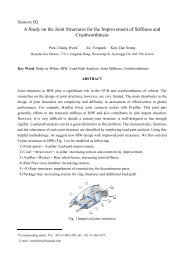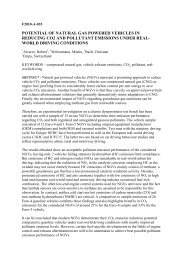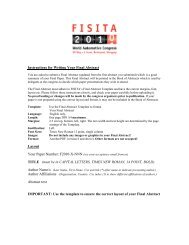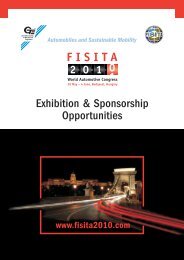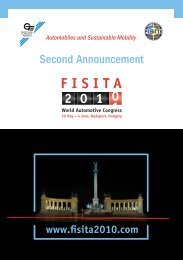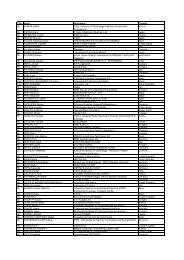Preliminary Programme - FISITA 2010 World Automotive Congress
Preliminary Programme - FISITA 2010 World Automotive Congress
Preliminary Programme - FISITA 2010 World Automotive Congress
Create successful ePaper yourself
Turn your PDF publications into a flip-book with our unique Google optimized e-Paper software.
Technical <strong>Programme</strong> - Wednesday, 2 June <strong>2010</strong><br />
Chair - Mike Noblett<br />
Chair - István Pintér<br />
Association of Hungarian<br />
<strong>Automotive</strong> Industry<br />
08:00 - 10:00<br />
A1-7 : IC Engines, Goals and<br />
Development<br />
F<strong>2010</strong>A156<br />
Development of an Innovative<br />
Direct-Injection System for<br />
Hydrogen Reciprocating Engines<br />
Dr. Stefania Zanforlin, Università<br />
di Pisa, ITALY<br />
F<strong>2010</strong>A159<br />
Hydrogen as a fuel - Lessons learnt<br />
Dr. Andreas Opfermann, Linde AG,<br />
GERMANY<br />
Plenary Sessions 11:00 - 12:30<br />
The Connected Vehicle - When will it be here?<br />
This session will discuss the requirements and opportunities presented by the “connected vehicle” - one which has data and communication links to the outside<br />
world. Cooperative systems utilize Vehicle-to-Vehicle and Vehicle-to-Infrastructure communications to enable features which improve safety, fuel economy and<br />
transport efficiency for the benefit of drivers and society. Furthermore, with most of the major manufacturers bringing plug in electric vehicles to market in the<br />
coming years, cooperative systems can play a crucial role in aiding customer acceptance by helping to improve driver behavior and increase battery life through<br />
critical monitoring and driver feedback systems.<br />
This session will discuss the action needed on the part of automakers, telematics providers and road operators in order to take the connected vehicle out of the<br />
research world and onto our roads, including:<br />
• What applications will be required and what applications can be enabled through such a communications pathway?<br />
• What role will the auto makers and the road operators play in defining and deploying communications infrastructure?<br />
• What communications pathways will be needed (GSM, WiFi, WiMax, DSRC, smart-gird, etc . . . )?<br />
• What feedback do drivers need in order to improve and modify their behavior?<br />
• What standards and communications protocols will be required to enable reliable, secure and anonymous data communications on such a large scale?<br />
Mr. Dirk Kessler<br />
BMW Group<br />
Repositioning in the <strong>Automotive</strong> <strong>World</strong><br />
Ivan Hodac<br />
ACEA<br />
F<strong>2010</strong>A162<br />
Influence of Inlet Pressure, EGR,<br />
Combustion Phasing, Speed and<br />
Pilot Ratio on High Load Gasoline<br />
Partially Premixed Combustion<br />
Mr. Vittorio Manente, Mr. Bengt<br />
Johansson, Mr. Per Tunestal, Lund<br />
University, SWEDEN<br />
Mr. William Cannella, Chevron<br />
Corporation, UNITED STATES<br />
F<strong>2010</strong>A164<br />
Development toward “Diesel<br />
Revolution” using Ultra High<br />
pressure CRS with closed-loop<br />
Mr. Steve Millstein<br />
ATX Group<br />
Edward ‘Ted’ Robertson<br />
Magna International<br />
control system for Heavy<br />
Duty Engine<br />
Mrs. Xiumei Wang, Mr. Takashi<br />
Kikutani, Mr. Noriaki Nakane,<br />
Mr. Katsuhiko Takeuchi, Denso<br />
Corporation, JAPAN<br />
08:00 - 10:00<br />
A2-4 : Consumption and Emission<br />
Reduction<br />
F<strong>2010</strong>A130<br />
EcoBoost : Downsized Gasoline<br />
DI Turbo Engines as the Backbone<br />
25<br />
Ms. Shelley Row<br />
US Dept. of Transportation<br />
invited<br />
Being an intensely market-oriented sector, the automotive industry is highly exposed to the effect of economic changes. The different rate of progress in<br />
the various economic regions and countries, the advancement of the global economy - or for that matter, its crisis - as well as the demand for sustainable<br />
development are all factors that shape this industry. These factors leave their mark on the various economic regions to different degrees and result in diverging<br />
patterns in automotive development despite the general trend of globalisation. The mission of this session is to analyse those actual and anticipated changes that<br />
emerge in the automotive and supply industry in response to the economic crisis and the diverging development paths of regional markets. The session will pay<br />
special attention to the Chinese automotive industry, as it is one of the world’s most dynamically progressing automotive sectors and the <strong>FISITA</strong> 2012 <strong>Congress</strong><br />
will take place in this country.<br />
Dr. Li Jun<br />
China FAW Group Corporation<br />
of Ford’s CO2 and Fuel Economy<br />
Product Strategy<br />
Dr. Martin Wirth, Mr. Dirk G. Borrmann,<br />
Ford Werke GmbH<br />
Dr. Andreas R. Schamel, Ford<br />
Research Center Aachen, GERMANY<br />
Mr. Eric W. Curtis, Mr. Dan R. Kapp,<br />
Mr. Thomas A. McCarthy, Ford Motor<br />
Company, UNITED STATES<br />
F<strong>2010</strong>A077<br />
Experimental Study of Pollutant<br />
Emission Reduction for Near-



